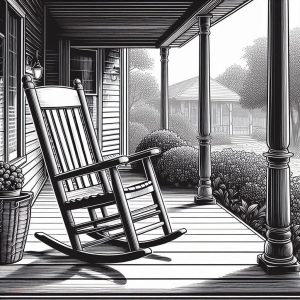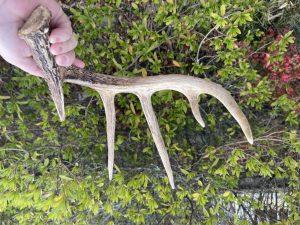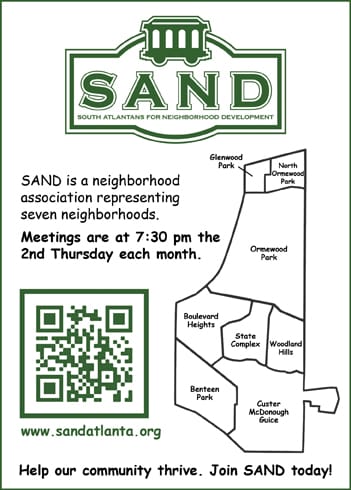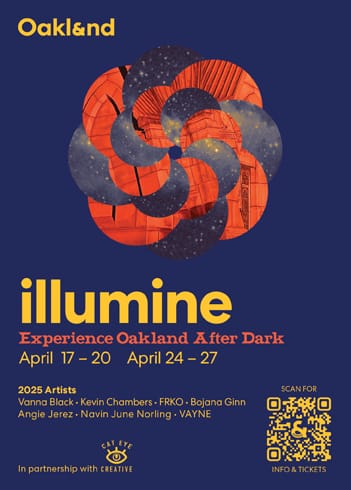By Tom McGowan
I met J.W. Clemmons about a year after I moved to Grant Park. He ran an antique and junk shop (or so he called it) on Pearl street in Cabbagetown. My varied schedule allowed me to stop in two or three times a week to see what he had.
There was a sign on the wall that he called my attention to more than once when I was thinking about buying something and not buying it. The sign said, “If you snooze you lose.” And I lost a few things but mostly I gained from knowing J.W. Clemmons.
In the warmer weather, as soon as I entered the shop, he would say, “Tom get in the Coke box and get yourself a cold Coca Cola.” It was an old-style horizontal Coke cooler, with small green bottles, and I fondly remember that sweet acid taste and carbonation hitting the back of throat on the way down. It cooled me off, slowed me down, took the rush off me. It was something I learned from him about selling – slow people down, spend time with them, talk to them and they might buy something.
J.W. had spent his life in and around the Cabbagetown Fulton Bag and Cotton Mills. He was a loom fixer for many years until the mill closed. He then got into selling new furniture and people wanted to trade out their old furniture and he finally figured out there was some money in antiques and switched to that instead. He had pickers working for him, bringing street finds or things from estate sales to put on sale. One helper was named Bump (although others called him Bunk), and he was at the shop more than not, and did the furniture moving when that was required.
I got to know J.W. and his wife Trudy (Miss Trudy he called her) well. It was not unusual for me to drop by their house on the West side of Cherokee Avenue just North of I-20 after hours. In fact, I bought the pine cabinet that is in my kitchen right out of their kitchen. The cabinet was obviously custom built to be installed in somebody’s house. Heavy heart pine, with locks on doors and small glass windows up top. I smile every time open it to get something in or out.
I never knew what would be in that shop, and a few finds are worth noting here. I bought my first working model steam engine, made by Weeden Manufacturing, established 1884, with a cast iron base, a shiny brass boiler and a tiny sight glass to check the water level. It was something I had wanted ever since I was a child, but that no child in my neighborhood ever owned due to cost. Put a fire under it, and the steam driven piston would drive a flywheel and make small accessories go to work.
When J.W. went through a slow spell and money was not coming in, I spotted a newly arrived item, two deer. Well painted they were and made of solid concrete. While I did not really need them, I weakened a bit given J.W.’s plight and did buy them. They have held down my porch for 40 years. At 100 plus pounds each, I never worried about them walking off in the middle of the night. They are named Buck and Doe, and more than a few children have mounted them for a photo op when they wear their red Christmas bows around their necks. Dogs are startled seeing them there, but soon judge they are not the real deal.
The biggest and most treasured thing I bought – and debated buying mightily due to being on a tight budget at the time – is a Murphy bed. It was built in the late 1800’s or early 1900’s apparently made by the Welch Manufacturing Company in Grand Rapids Michigan, established in 1886. The Murphy bed folds down from one side and when you spin it around, the other side is a chifforobe (a word I learned from J.W.) for hanging up clothes. It has a door with a full-length bevel glass mirror on it, with hinges showing years of use (I shimmed them up with tiny brass bushings). It is made of quarter sawn oak with the original finish, never sanded or altered or stained. One end is darker than the other. I suspect it faced a window or perhaps a fireplace and got a little more heat or sunlight over the years. It had some carvings on it that made it look a little bit ecclesiastical. The bed is 3/4 size and came with a horsehair mattress. When you let the bed down, the springs make ominous spooky noises that sometime frighten young children. But many a child and niece and nephew slept in that bed over the years and had a tale to tell from being on it. It was big and heavy and I was a little uncertain even about getting it back in my truck, but J.W. did say – and at least it was true after I put a new set
Rocking Chair Reflections – Page 1 of 2
of wheels on it – that “even the little lady” could turn it around.
We had a two-way relationship, I did renovation work on his house repairing plumbing and such and he gave me advice on places to go and what to do to make my way intown, things I wouldn’t have known otherwise. He asked me for help one time to move a washing machine from his aunt’s second floor to the first floor. She lived in Cabbagetown in an old and high-ceilinged house. I said I was tight on time but if he could wait a few days, I would take care of it. I knew about moving furniture with hand trucks and did rigging, so I was not a novice. When I showed up the next Saturday asking, “J.W. do you still need that washing machine moved?” he said, “Oh there’s a story…” I sat down and he commenced to tell me that another neighbor and his buddy went to take care of the task. He said as they were coming down the stairs and it got a loose of them. When he said that, hair on the back of my neck stood up. Being experienced on such things, I was mentally cringing while envisioning the washer and hand truck giving in to gravity. You do not want something to get a loose of you. He said the washing machine came down the stairs, took out the balusters and railing and took out the washing machine too. The good news is nobody went to the hospital.
One day I went to the shop when J.W. was getting on in years. He said he was not feeling well, looked pasty, and if he stood up and walked, he got faint. I said J.W., this does not sound good I think you need to get looked at. I headed out the door, and lucky for J.W., the next person in was his doctor who worked out of the nearby Georgia Baptist Medical Center. He quickly diagnosed J.W. and got him to lock up the shop and took him down to the hospital post haste. The found the heart medicine that initially helped him had become toxic to him and slowed down his pulse rate to the point where he was not pumping blood up to his head. They slapped in a pacemaker and he was good as new.
I should finish the story by saying that I learned a lot from J.W. He was a bit like the uncle we all should have, passing on a bit here about selling, a bit there about local history and context for my new life in atlanta, about making decisions, and not snoozing and loosing. The one I remember most was after he had the heart problem that near killed him. Looking back on his life he said, “Tom, if I had to do it all over again, I would have spent more time fishing.”








Comments are closed.